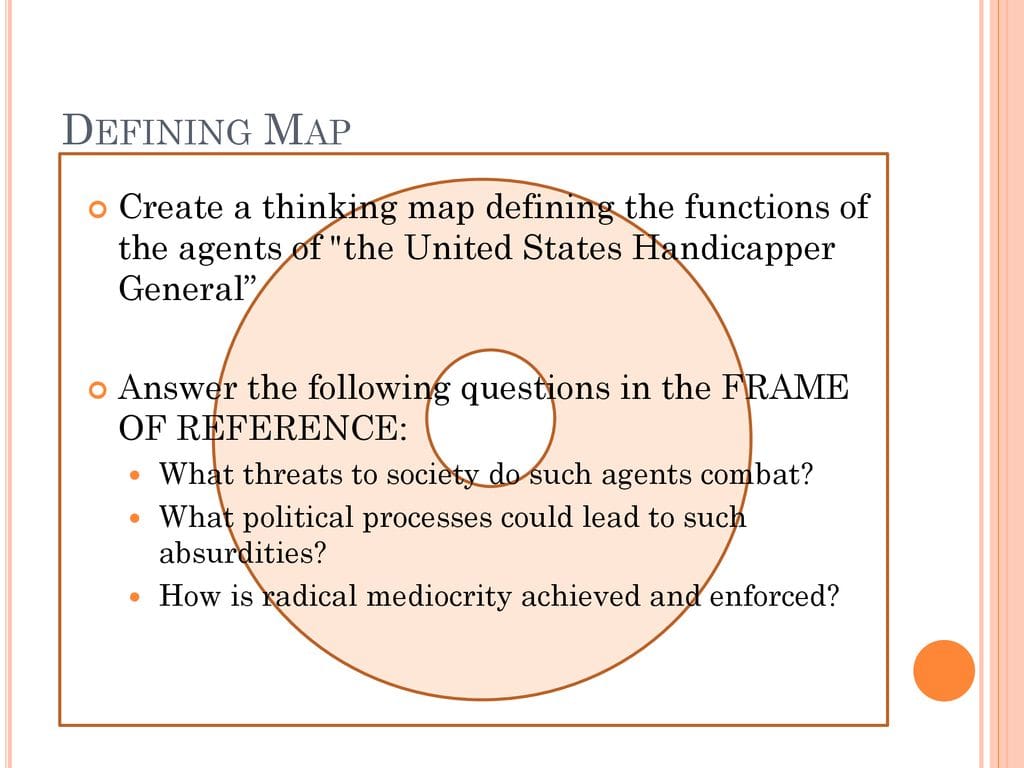In Kurt Vonnegut’s chillingly prescient short story, “Harrison Bergeron,” we encounter Diana Moon Glampers, the Handicapper General, a figure who embodies the unsettling consequences of a society obsessed with enforced equality. This exploration delves into Glampers’ role, her motivations, and the implications of her actions within this dystopian world. We’ll examine the story’s potent symbolism and its enduring relevance to contemporary discussions about equality, freedom, and the nature of a just society.
The Iron Fist of Equality: Decoding the Handicapper General
In Vonnegut’s 2081 dystopia, equality isn’t about opportunity; it’s about outcome. Everyone is mandated to be equal, regardless of natural abilities. Diana Moon Glampers, the Handicapper General, sits at the heart of this enforced mediocrity, ensuring no one rises above the prescribed average. Her very title, a chilling oxymoron, suggests a general leading an army of disability, a force dedicated to leveling the playing field by crippling excellence. Curious about how game conservation laws affect hunters? The control exerted by authorities in the natural world finds a disturbing parallel in Glampers’ control over human potential.
Glampers’ methods are as brutal as they are swift. The ballerina burdened with weights, the brilliant mathematician plagued by thought-interrupting devices—these are the hallmarks of her reign. She is the architect of this oppressive system, a system that, ironically, uses handicaps to achieve its vision of equality.
The execution of Harrison Bergeron, a young man who embodies exceptional intelligence, strength, and beauty, serves as a stark example of Glampers’ ruthlessness. Harrison’s defiant rebellion against enforced mediocrity is swiftly extinguished, showcasing Glampers’ commitment to maintaining the status quo, no matter the cost.
The Paradox of Equality: What Does a Handicapper General Do?
The Handicapper General isn’t an elected official; she’s an enforcer. Her role is to ensure absolute conformity, suppressing any deviation from the prescribed average. This involves the implementation and enforcement of handicaps: weights, masks, thought-interrupting devices—tools designed to neutralize any advantage, whether physical or intellectual.
This enforcement mechanism raises profound questions about the very nature of equality. Is it about dragging everyone down to the lowest common denominator, as Glampers’ actions suggest? Or is it about providing equal opportunities, even if that means some individuals will inevitably excel? Vonnegut likely leans toward the latter, suggesting that suppressing individual talents hinders both personal growth and societal advancement.
The Handicapper General’s methods, seemingly aimed at creating a fair society, ultimately stifle personal growth and freedom. This begs the question: what is the true cost of enforced equality? Recent literary analysis suggests that the Handicapper General could be interpreted as a symbol of oppressive government control, stifling creativity and progress in the name of equality, perhaps even driven by a fear of difference or her own suppressed potential. This adds layers of complexity to her character and the system she represents.
Unmasking the Enforcer: Who is Diana Moon Glampers?
Diana Moon Glampers, the Handicapper General, is the embodiment of oppressive control in Vonnegut’s dystopian world. She rules with an iron fist, enforcing a twisted version of equality where everyone is reduced to the lowest common denominator. Her chilling efficiency is most evident in the swift elimination of Harrison Bergeron, a stark warning against embracing individuality.
While Glampers appears monstrous, some interpretations suggest a more nuanced understanding. Perhaps her ruthlessness stems from a deep-seated fear of chaos or a subconscious suppression of her own potential. This ambiguity adds complexity to her character, raising questions about the nature of power and control.
Glampers serves as a cautionary tale, highlighting the dangers of taking any ideology to an extreme. What starts as a pursuit of fairness can devolve into oppressive conformity. This unsettling reality prompts us to consider the delicate balance between equality and freedom.
Key Characteristics of Diana Moon Glampers:
| Trait | Description |
|---|---|
| Title | Handicapper General |
| Objective | Enforce absolute equality, suppressing individuality and excellence |
| Methods | Uses handicaps to limit abilities; swift and ruthless punishment |
| Motivation | Likely driven by fear of superiority, chaos, or even her own potential |
| Significance | Represents dangers of enforced conformity and unchecked control |
Deconstructing the Symbol: What Does the Handicapper General Symbolize?
Diana Moon Glampers transcends her role as a character; she embodies the chilling potential of extreme egalitarianism. She represents the danger of pursuing equality to the point of suppressing individual achievement. The handicaps she enforces are not merely physical restraints; they symbolize the suppression of potential and the fear of difference.
Glampers also symbolizes the dangers of unchecked authority. Her ruthless enforcement of conformity highlights the potential for abuse when power is concentrated. This underscores the importance of safeguarding individual freedoms, even—perhaps especially—when pursuing seemingly noble goals.
Key Symbolism of the Handicapper General:
| Symbolism | Explanation |
|---|---|
| Extreme Egalitarianism | The perversion of equality into a tool for oppression. |
| Suppression of Individuality | The stifling of unique talents and abilities in the name of uniformity. |
| Enforced Mediocrity | The deliberate suppression of excellence, creating a stagnant society. |
| Fear of Difference | The apprehension and rejection of individuality as a threat to the established order. |
| Dangers of Unchecked Authority | The potential for tyranny disguised as the pursuit of a utopian ideal. |
| Importance of Freedom and Excellence | The essential role of individual liberty and the pursuit of excellence in a thriving and dynamic society. |
Vonnegut’s “Harrison Bergeron” continues to resonate because it forces us to confront uncomfortable questions. What is the true meaning of equality? What price are we willing to pay for a society that’s “equal”? The ongoing debate about these concepts suggests that the story remains as relevant and thought-provoking today as when it was first published. The Handicapper General serves as a stark reminder of the potential for tyranny to masquerade as equality and the enduring importance of safeguarding individual freedoms against the seductive allure of enforced mediocrity.
- Crypto Quotes’ Red Flags: Avoid Costly Mistakes - June 30, 2025
- Unlock Inspirational Crypto Quotes: Future Predictions - June 30, 2025
- Famous Bitcoin Quotes: A Deep Dive into Crypto’s History - June 30, 2025
















